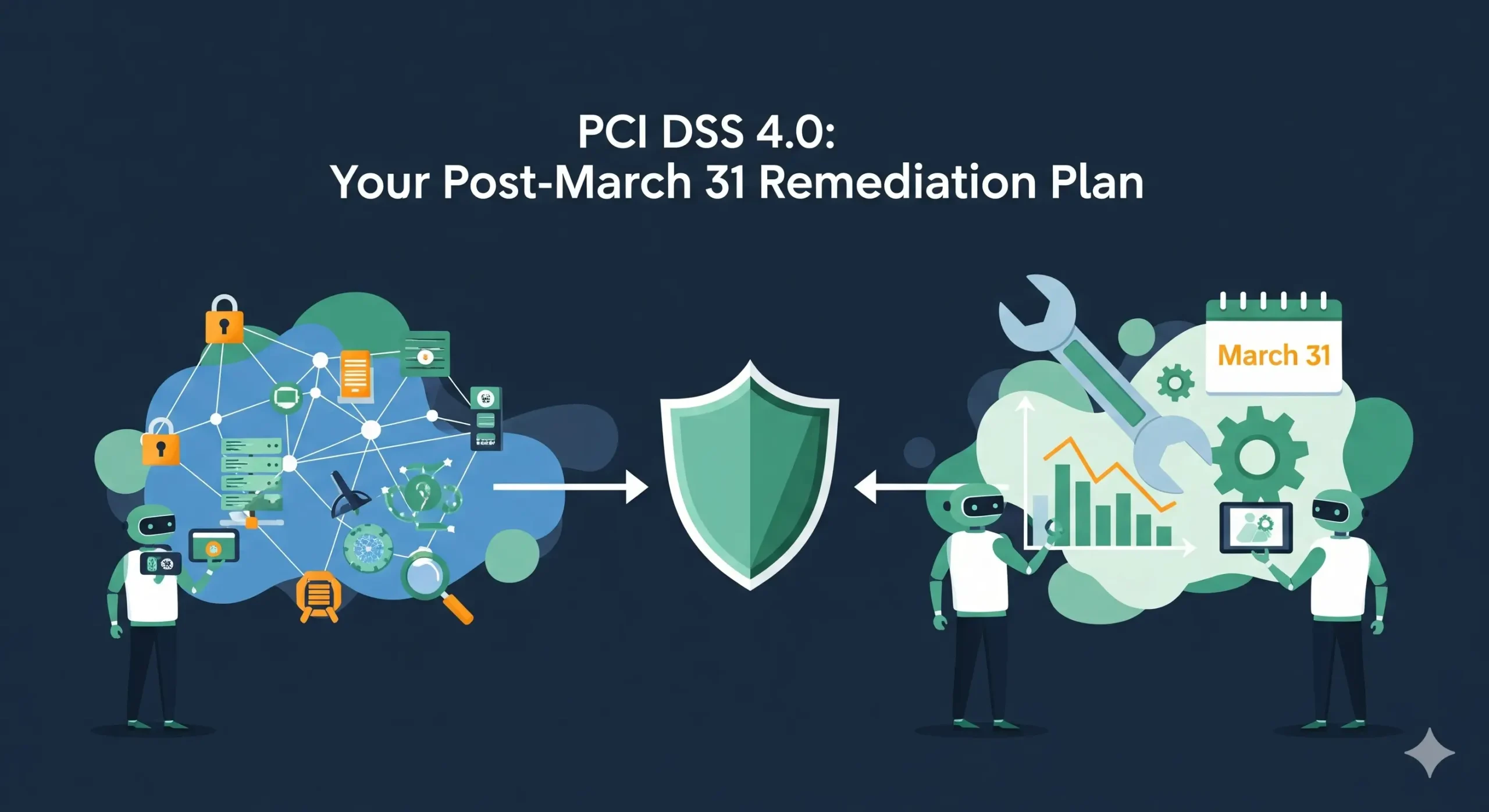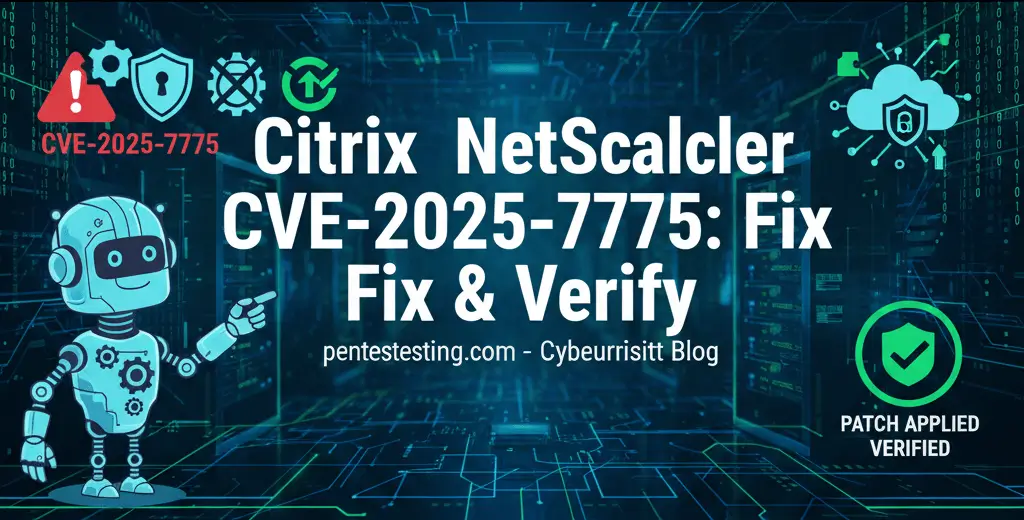DORA TLPT 2025: 7 Powerful Moves to Fix First
If you’re a financial entity or ICT service provider touched by DORA TLPT 2025, you’re now judged on two things: (1) how fast you can find and fix risk and (2) how well you can prove it. This playbook gives a developer-first, auditable path to remediation that maps to EU 2025/1190 expectations—without drowning you in paperwork.
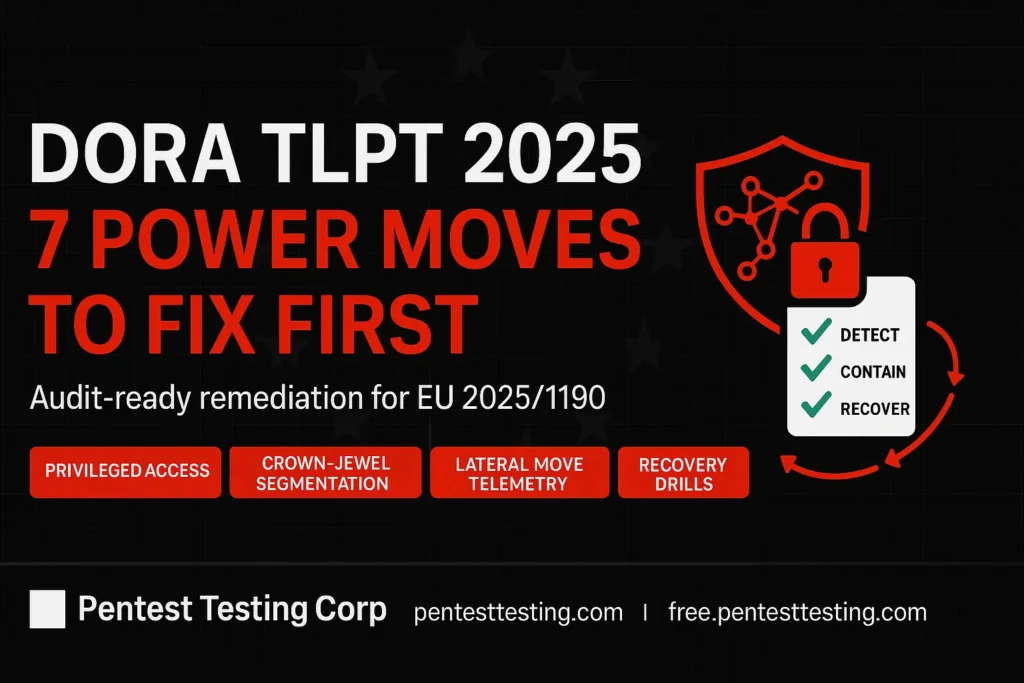
Racing the Oct 31 deadline? Our ISO 27001:2022 transition remediation playbook shows 7 urgent fixes, a 72-hour evidence sprint, and Annex A mapping—plus retest proof. Open the guide
TL;DR – Focus fixes where they collapse blast radius, raise detection fidelity, and create audit-ready evidence. Then wire those artifacts into your incident-reporting timelines.
Who must run TLPT and what supervisors expect (in plain English)
- Who & when: Financial entities in scope (and key third-party ICT providers supporting critical/important functions) must undergo threat-led penetration testing against real attacker TTPs on a regulator-defined cadence.
- What supervisors expect to see:
- Scope centered on critical/important functions (CIFs) and the end-to-end chain (apps, APIs, identity, hosting, supply, and ops),
- Methodology based on credible intel/TTPs,
- Closure with verified fixes and re-tests, and
- Remediation evidence sufficient for cross-border mutual recognition.
- Timelines to wire in: Operate to the standard incident-reporting guardrails you’ll be measured against—initial within 4h of classification/24h of detection, interim ~72h, final ≤30 days—so your TLPT findings auto-produce reporting-grade artifacts.
When you’re ready to move from findings to fixes with audit-ready proof, our Risk Assessment Services and Remediation Services accelerate the path.
The “Fix-First” Roadmap (7 Power Moves)
Each move includes practical, copy-pasteable snippets your engineers can apply today.
1) Lock down management planes (no internet-exposed admin)
Goal: Restrict admin UIs/SSH/RDP to jump boxes/VPN only with strict allow-lists and MFA.
Terraform (AWS security group)
resource "aws_security_group" "mgmt_plane" {
name = "mgmt-plane-sg"
description = "Restrict admin to jumpbox CIDR"
vpc_id = var.vpc_id
ingress {
description = "SSH from jumpbox"
from_port = 22
to_port = 22
protocol = "tcp"
cidr_blocks = ["10.10.10.0/24"] # jumpbox/VPN CIDR only
}
egress {
from_port = 0
to_port = 0
protocol = "-1"
cidr_blocks = ["0.0.0.0/0"]
}
tags = { "DORA_TLPT" = "mgmt-plane-locked" }
}Linux sshd_config hardening
PasswordAuthentication no
PermitRootLogin no
PubkeyAuthentication yes
AllowUsers adminops
AuthenticationMethods publickey,keyboard-interactive
KbdInteractiveAuthentication yes
ChallengeResponseAuthentication yesUFW quick allow-list
ufw default deny incoming
ufw allow from 10.10.10.0/24 to any port 22 proto tcp
ufw enableTie this to your Web Application Pentest Testing scope to verify there are zero dangling admin surfaces.
Free Website Vulnerability Scanner Tool Page Screenshot
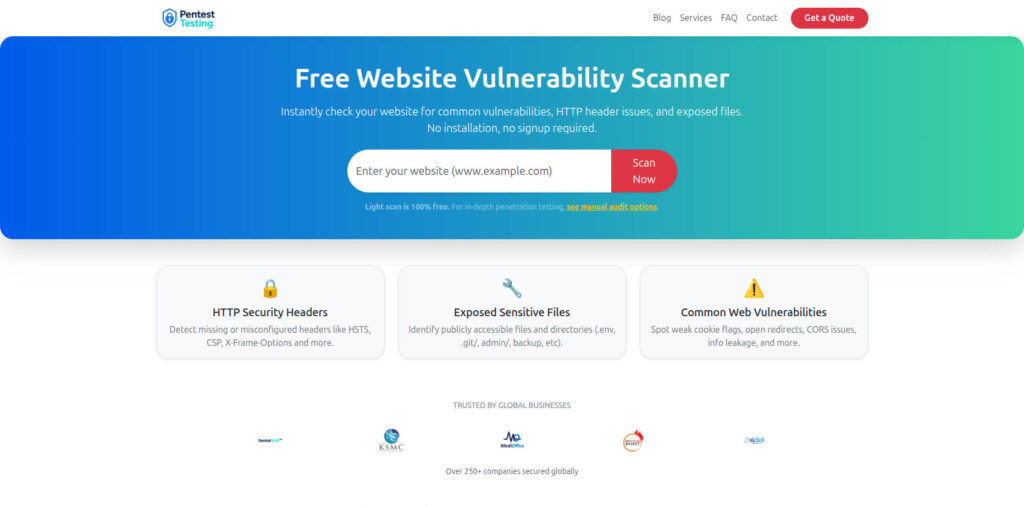
2) Segment “crown-jewel” paths (no flat networks)
Goal: Prove that CIF data paths can’t be reached without crossing logged choke points.
Kubernetes NetworkPolicy (deny-by-default; allow only app→db)
apiVersion: networking.k8s.io/v1
kind: NetworkPolicy
metadata:
name: cj-db-allow
namespace: prod-cj
spec:
podSelector:
matchLabels:
tier: database
policyTypes: [Ingress]
ingress:
- from:
- podSelector:
matchLabels:
tier: app
ports:
- protocol: TCP
port: 5432nmap reachability test (CI check)
nmap -Pn -p 22,3389,5432,6379,9200 10.20.0.0/16 --max-retries 1 --min-rate 500 -oG - | \
awk '/Up$/{print $2" "$3}' > segmentation.grep
test ! -s segmentation.grep # fail build if any unexpected open mgmt/db ports3) Telemetry for lateral movement (collect before you need it)
Goal: Make “east-west” moves noisy and attributable (Kerberos/NTLM, SMB shares, RDP hops).
Suricata rules (basic SMB/RDP movement hints)
alert tcp any any -> any 445 (msg:"Lateral SMB write"; flow:to_server,established; content:"|FF 53 4D 42|"; depth:4; sid:100001;)
alert tcp any any -> any 3389 (msg:"RDP lateral pivot"; flow:to_server,established; sid:100002;)Windows PowerShell – enable process/command line auditing
# Enable process creation events w/ command-line
New-Item -Path "HKLM:\Software\Microsoft\Windows\CurrentVersion\Policies\System\Audit" -Force | Out-Null
auditpol /set /category:"Detailed Tracking" /subcategory:"Process Creation" /success:enable /failure:enable
wevtutil sl Security /e:true4) Privileged access hardening (PAM/MFA/Just-In-Time)
Goal: Eliminate standing admin; require MFA and short-lived elevation.
Ansible – require TOTP for sudo via PAM
- name: Enforce TOTP for sudo
hosts: linux_admin
become: yes
tasks:
- name: Install google-authenticator PAM
apt: { name: libpam-google-authenticator, state: present, update_cache: yes }
- name: Add PAM line
lineinfile:
path: /etc/pam.d/sudo
insertafter: '^\s*#%PAM-1.0'
line: 'auth required pam_google_authenticator.so nullok'
- name: Require tty for sudo
lineinfile:
path: /etc/sudoers
regexp: '^Defaults\s+requiretty'
line: 'Defaults requiretty'
validate: 'visudo -cf %s'5) Recoverability drills (prove you can stand back up)
Goal: Snapshots + restores tested on schedule; artifact everything.
Bash – snapshot & checksum evidence
TS=$(date -u +"%Y%m%dT%H%M%SZ")
aws rds create-db-snapshot --db-instance-identifier cj-prod --db-snapshot-identifier cj-prod-$TS
aws ec2 create-snapshot --volume-id vol-abc123 --description "CIF-vol-$TS" | tee ec2-snap.json
jq -r '.SnapshotId' ec2-snap.json >> evidence/snapshots-$TS.txt
sha256sum evidence/* > evidence/manifest-$TS.sha2566) Secure build & delivery (signed artifacts; SBOMs)
Goal: Ensure anything touching CIFs is verified and attestable.
GitHub Actions – sign image + attach SBOM
name: supply-chain
on: [push]
jobs:
build-sign:
runs-on: ubuntu-latest
steps:
- uses: actions/checkout@v4
- run: docker build -t registry/org/cj-api:${{ github.sha }} .
- run: cosign sign --key env://COSIGN_KEY registry/org/cj-api:${{ github.sha }}
- run: syft packages dir:. -o spdx-json > sbom-${{ github.sha }}.json
- uses: actions/upload-artifact@v4
with: { name: sbom, path: sbom-${{ github.sha }}.json }7) Evidence packs mapped to RTS (for mutual recognition)
Goal: Bundle artifacts supervisors care about—once—so they travel with you across jurisdictions.
Python – build an evidence bundle with metadata
import json, os, tarfile, time, hashlib, pathlib
ARTS = {
"project_charter.pdf": "governance",
"tlpt_scope.pdf": "scope",
"test_plan.pdf": "methodology",
"attack_narrative.md": "execution",
"fix_log.csv": "closure",
"retest_results.txt": "verification",
}
meta = {"standard":"EU 2025/1190","created":time.strftime("%Y-%m-%dT%H:%M:%SZ"),"items":[]}
for f, cat in ARTS.items():
if os.path.exists(f):
sha = hashlib.sha256(open(f,"rb").read()).hexdigest()
meta["items"].append({"file":f,"category":cat,"sha256":sha})
pathlib.Path("evidence").mkdir(exist_ok=True)
with open("evidence/manifest.json","w") as fh: json.dump(meta, fh, indent=2)
with tarfile.open("evidence/pack.tgz","w:gz") as tar:
tar.add("evidence/manifest.json")
for f in ARTS:
if os.path.exists(f): tar.add(f)
print("Evidence pack built at evidence/pack.tgz")Tie remediation to incident-reporting timelines (so you never scramble)
Map your TLPT program outputs to the operational clock you’ll be measured against:
- Initial: within 4 hours of classification/24 hours of detection → auto-generate an initial notice from your TLPT tracker with affected CIFs, preliminary TTPs, and known impact.
- Intermediate: ~72 hours → push an update with containment status, evidence of segmentation efficacy (e.g., blocked east-west attempts), and identity hardening actions taken.
- Final: ≤1 month → ship a signed attestation, attack narrative, and retest evidence pack.
Our team wires these outputs into your processes during Risk Assessment Services and validates them during Web Application Pentest Testing.
How Pentest Testing Corp gets you auditor-ready (fast)
- Scope & triage your CIFs, management planes, and supply chain.
- Hands-on remediation with developer-ready diffs, config PRs, and IaC.
- Re-test & attest with bundle-ready artifacts your supervisors expect.
Start here: Risk Assessment Services, Remediation Services, and Web App Pentest Testing—and grab a quick health check with our free website scanner.
Recent blogs you’ll find useful
- ASVS 5.0 Remediation: 12 Exclusive Battle-Tested Fixes (practical, fix-first).
- CVE-2025-41244 VMware Remediation: 7-Step Rapid Playbook (evidence tactics).
- CISA KEV Adds CVE-2025-5086: What You Must Do (prioritization & proof).
- AI App Security Audit: 7 VAPT Reveals & Fixes (case-study style).
Sample Report Screenshot by the free tool to check Website Vulnerability
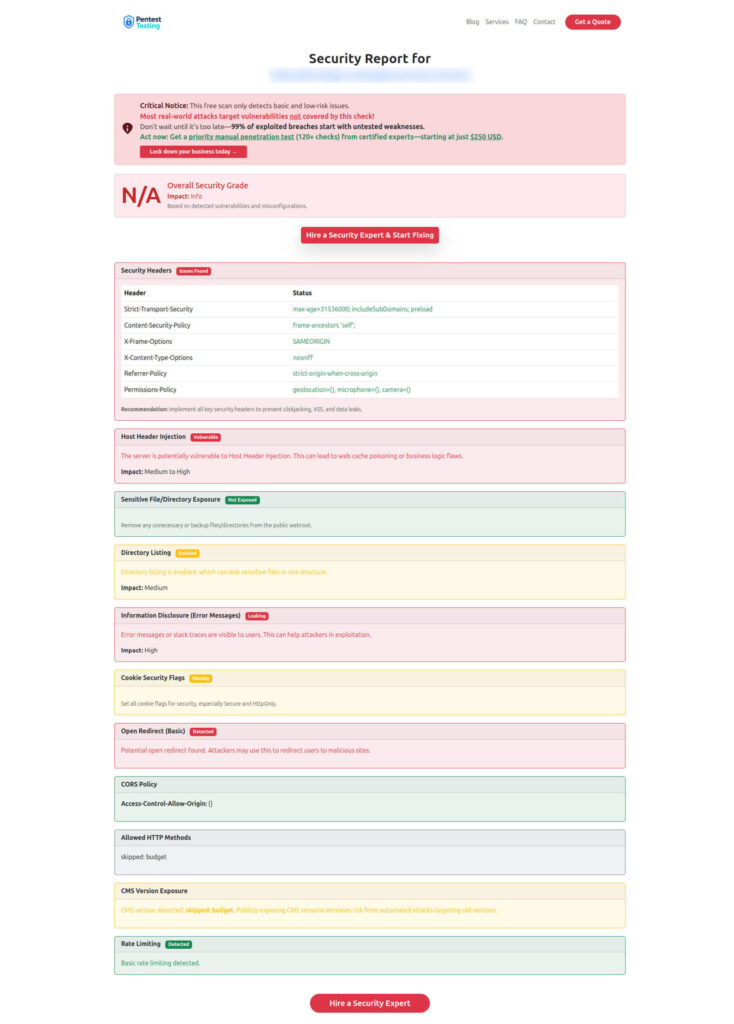
Developer checklists (copy & adapt)
Identity & Access
- JIT admin with MFA; remove standing domain admins
- Break-glass accounts out-of-band; quarterly tests
- Disable legacy auth; enforce strong OIDC/OAuth flows
Network & Platform
- No internet-facing admin; VPN/ACL only
- Crown-jewel namespaces isolated; deny-by-default
- Egress control to secrets/signing infra
Detect & Respond
- Endpoint & network telemetry for lateral movement
- Centralized log retention ≥ the reporting window
- Runbook targets: initial 4h/24h, interim ~72h, final ≤30d
Recovery
- Immutable backups + crypto-checksum manifests
- Monthly restores in a sterile VPC/project
- Evidence pack automatically produced per run
Get help now
- Book remediation & evidence planning: Remediation Services
- Scope TLPT and CIFs fast: Risk Assessment Services
- Validate with hands-on testing: Web Application Pentest Testing
- Quick pre-check: Website Vulnerability Scanner Online Free
Or email us: [email protected] — subject: “DORA TLPT 2025”.
🔐 Frequently Asked Questions (FAQs)
Find answers to commonly asked questions about DORA TLPT 2025 / EU 2025/1190.
